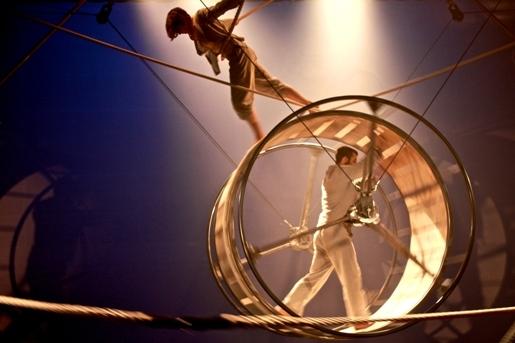The Fulham troupe's name isn't what it seems - it celebrates a medieval metaphor for scraping away complicated options and going for the simple thing. Too simple in The Mill, which seems to have scraped away the fiendish physical options too from its magnificent wheels, ropes and pulleys, resulting in what is really an excellent corporate teamwork video let loose in too large a theatre opportunity.
Still, there is here an entertainingly enough devised observational comedy about how people behave when factory systems are imposed on them, and how, especially, boredom makes people dangerous, because it sets imagination and individuality running free.
Sound and set are well roped together by the Ockham team for dramatic atmosphere: a factory bell sounds, machinery clanks loudly, a hollow tick-tock suggests the insides of Big Ben, the wheels and reels are turned effortfully by the human beings trudging inside, on top or between the wheels, in a constant interdependency of meaningless energy created by the vast white rope that joins everything up. The slaves shout cues to each other: “Set.” “Walk.” A disembodied female voice barks orders through the loudspeaker: “Rotate”, “Rest period”, “Resume labour”.
“Rotate” (a wry nod to the order that gymnasts use to move from one piece of equipment to another) means a dumbly repetitive change of position from one wheel to another. The jollity comes in the individual ways these supremely bored factory-hands devise to vary the transitions between their rotations. They don’t just push a wheel boredly, they roll under it, or hop onto it, or do handstands, trying in some way both to alleviate their tedium and play one-upmanship with their colleagues. People hate being bored. And when they’re bored, they don't behave.
Mischief erupts. When tall Charlotte Mooney sullenly refuses to play her part in powering the great central wheel, an accident happens to someone else down the line. But it's because the machine stops that the red light flashes and the loudspeaker insists, “System fault. Establish new system." Scores are amusingly paid out: one man finds himself forced singlehandedly to stabilise a rope that the other four, far from helping with, have decided to play hookey on, shinning up it or having a lie-down on it (a tricky-looking feat), grinning down at him for being had. Another man, who expresses himself with some freelance highwire-walking on the rope, finds himself undermined as the others evilly make the rope saggier and saggier until he has to get back to work.
The accurate observation of the slyness and unreliability of drudge workers is the French mime side of the Ockham’s Razor production, I’d guess, and sharp as mustard. It’s directed by Toby Sedgwick (who did the horse choreography in the National Theatre's War Horse), himself trained under Jacques Lecoq, the guru of French mime theatre.
The show's potential effectiveness, though, is undercut by the less than gripping circus-skill level, which limits the climax's theatrical potency when (as you expect) the great wheel system breaks down irretrievably thanks to individual rebellion. The erupting chaos surely demands razor-sharp physical slapstick rather than an ordinary mumming of fistfights, and there isn’t a shock of desolation when the workers suddenly come to their senses. The Mill has a good story to tell, sure, but is just a bit run-of-the-mill.
Ockham's Razor's The Mill continues at the Linbury Studio Theatre, Royal Opera House until tomorrow. There is a meet-the-artists tonight. Information and booking via the London International Mime Festival site.
Read Jasper Rees's article on Ockham's Razor and see production stills from The Mill and other shows















Add comment